|
|
|
Sort Order |
|
|
|
Items / Page
|
|
|
|
|
|
|
| Srl | Item |
| 1 |
ID:
095095
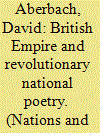

|
|
|
|
|
| Publication |
2010.
|
| Summary/Abstract |
The British empire set off an explosion of poetry, in English and native languages, particularly in India, Africa and the Middle East. This poetry - largely neglected in the scholarship on nationalism - was often revolutionary both aesthetically and politically, expressing a spirit of cultural independence. Attacks on England and the empire are common not just in native colonial poetry but also in poetry of the British isles. This article discusses some of the most influential poets, including: Shawqi of Egypt, Tagore of India, Rusafi of Iraq, Yeats of Ireland, Iqbal of Pakistan, Greenberg of pre-State Israel, and Kipling, the 'poet of empire'. In contrast with other empires, many poets were inspired by British culture to create revolutionary art and seek political independence. Most strikingly, British rule was instrumental in the revival of vernacular Hebrew poetry after 1917 as the centre of Hebrew literature shifted from Odessa to Tel Aviv.
|
|
|
|
|
|
|
|
|
|
|
|
|
|
|
|
| 2 |
ID:
095094
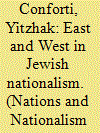

|
|
|
|
|
| Publication |
2010.
|
| Summary/Abstract |
This article analyses the ethnic and civic components of the early Zionist movement. The debate over whether Zionism was an Eastern-ethnic nationalist movement or a Western-civic movement began with the birth of Zionism. The article also investigates the conflict that broke out in 1902 surrounding the publication of Herzl's utopian vision, Altneuland. Ahad Ha'am, a leader of Hibbat Zion and 'Eastern' cultural Zionism, sharply attacked Herzl's 'Western' political Zionism, which he considered to be disconnected from the cultural foundations of historical Judaism. Instead, Ahad Ha'am supported the Eastern Zionist utopia of Elchanan Leib Lewinsky. Hans Kohn, a leading researcher of nationalism, distinguished between 'Eastern' and 'Western' nationalist movements. He argued that Herzl's political heritage led the Zionist movement to become an Eastern-ethnic nationalist movement. The debate over the character of Jewish nationalism - ethnic or civic - continues to engage researchers and remains a topic of public debate in Israel even today. As this article demonstrates, the debate between 'Eastern' and 'Western' Zionism has its foundations in the origins of the Zionist movement. A close look at the vision held by both groups challenges Kohn's dichotomy as well as his understanding of the Zionist movement.
|
|
|
|
|
|
|
|
|
|
|
|
|
|
|
|
| 3 |
ID:
095098


|
|
|
| 4 |
ID:
095096
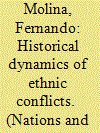

|
|
|
|
|
| Publication |
2010.
|
| Summary/Abstract |
All the historical moments in which the Basque debate reached political protagonism in contemporary Spain coincided with political contexts of institutional democratisation. The debate on patriotism in the Basque Country is connected with a uniform narrative regarding the Basques and their moral distance from the Spanish nation: the 'Basque problem'. This narrative has fostered a confrontational discourse between Spanish and Basque nationalism. It has also promoted recourse to specific stereotypical images of the Basques, which bind ethnicity to collective identity. Such representations reveal that the invention of the Basque country as a uniform ethnic collective had much more to do with the internal contradictions of Spanish national identity - and later of Basque identity - than with the existence of a secular conflict between Basques and Spaniards. The Basque case shows that every 'ethnic conflict' requires adequate contextualisation in order to avoid simplifying its origins and past pathways to make it conform to present uses.
|
|
|
|
|
|
|
|
|
|
|
|
|
|
|
|
| 5 |
ID:
095101
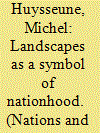

|
|
|
|
|
| Publication |
2010.
|
| Summary/Abstract |
While the dominant discourse of the Lega Nord, the party that proposes the independence of 'Padania', i.e. northern Italy, emphasises the region's economic success, contributions in the party literature on the Padanian landscape focus on the Alps. The Alps symbolise both the rootedness of the nation in tradition and ethnic identity and the intrinsic link between these traditions and modernity. They embody self-government of mountain communities and local traditions of political autonomy, but also appear as a protective bulwark against invasions of the Padanian lowlands. The focus on the Alps, an economically peripheral territory, is symptomatic of the reluctance to represent the environmental degradation caused by development in the lowlands. Contributions on the Alps, however, also reveal the tension between modernisation and the preservation of culture and territory and the need for new development models. Discussions on the Alps thus reveal the contradictions in the party's construction of a national identity based on modernity rooted in tradition.
|
|
|
|
|
|
|
|
|
|
|
|
|
|
|
|
| 6 |
ID:
095097
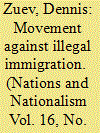

|
|
|
|
|
| Publication |
2010.
|
| Summary/Abstract |
The goal of this article is to analyse the political communication style of the Movement Against Illegal Immigration (Dvizheniye Protiv Nelegalnoy Immigrazii - DPNI), which is one of the central nodes in the Russian extreme-right movement web network. In the article, the political communication style of the organisation is investigated at two levels - the presentation of online identity and the presentation of offline identity. Online self-presentation is studied by means of the qualitative analysis of the incoming links (position in the web network) and the internal structure of the website. DPNI is conceptualised as a new type of political organisation based on the networking principle allowing flexible membership and based on the interplay of its online and offline self-presentations. The study provides insights into how the new media become embedded in the political communication of extreme-right political organisations in Russia.
|
|
|
|
|
|
|
|
|
|
|
|
|
|
|
|
| 7 |
ID:
095100
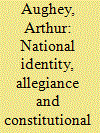

|
|
|
|
|
| Publication |
2010.
|
| Summary/Abstract |
It has become conventional to discuss nationalism in terms of identity. While this approach is fruitful and illuminating, it can often be ambiguous, running together cultural, social, personal and political issues. It becomes particularly problematic when discussing multinationalism, the character of which may be confused by reference to national identity alone. Allegiance is used in this article to explore how a political commitment to the multinational state can coexist with a range of national and regional identities in the United Kingdom. The argument is that, recent constitutional changes notwithstanding, the multinational ideal involves still a state of distinctive national identities tempered by the habit of allegiance to legitimate British government.
|
|
|
|
|
|
|
|
|
|
|
|
|
|
|
|
| 8 |
ID:
095099
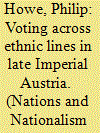

|
|
|
|
|
| Publication |
2010.
|
| Summary/Abstract |
The Austrian party system, following the introduction of universal manhood suffrage in 1907, has conventionally been characterised as being divided along ethno-national lines, reinforcing perceptions that politics within the Habsburg Empire was overwhelmingly driven by nationalism. However, the electoral results in a number of districts only make sense if one assumes that voters cast ballots for their alleged ethnic opponents. A systematic analysis of election results, utilising a simple process of elimination and drawing on the highly detailed statistical records available, strongly suggests that such voting was commonplace. Furthermore, alternative explanations based on differential voting qualification rates, errors in the census, and electoral fraud do not withstand close scrutiny. One must therefore conclude that although ethnic conflict did occur, it was paralleled by inter-ethnic bargaining and compromise, thereby supporting more positive appraisals of Austrian electoral and parliamentary politics and of representative political institutions in ethnically divided societies.
|
|
|
|
|
|
|
|
|
|
|
|
|
|
|
|
|
|
|
|
|